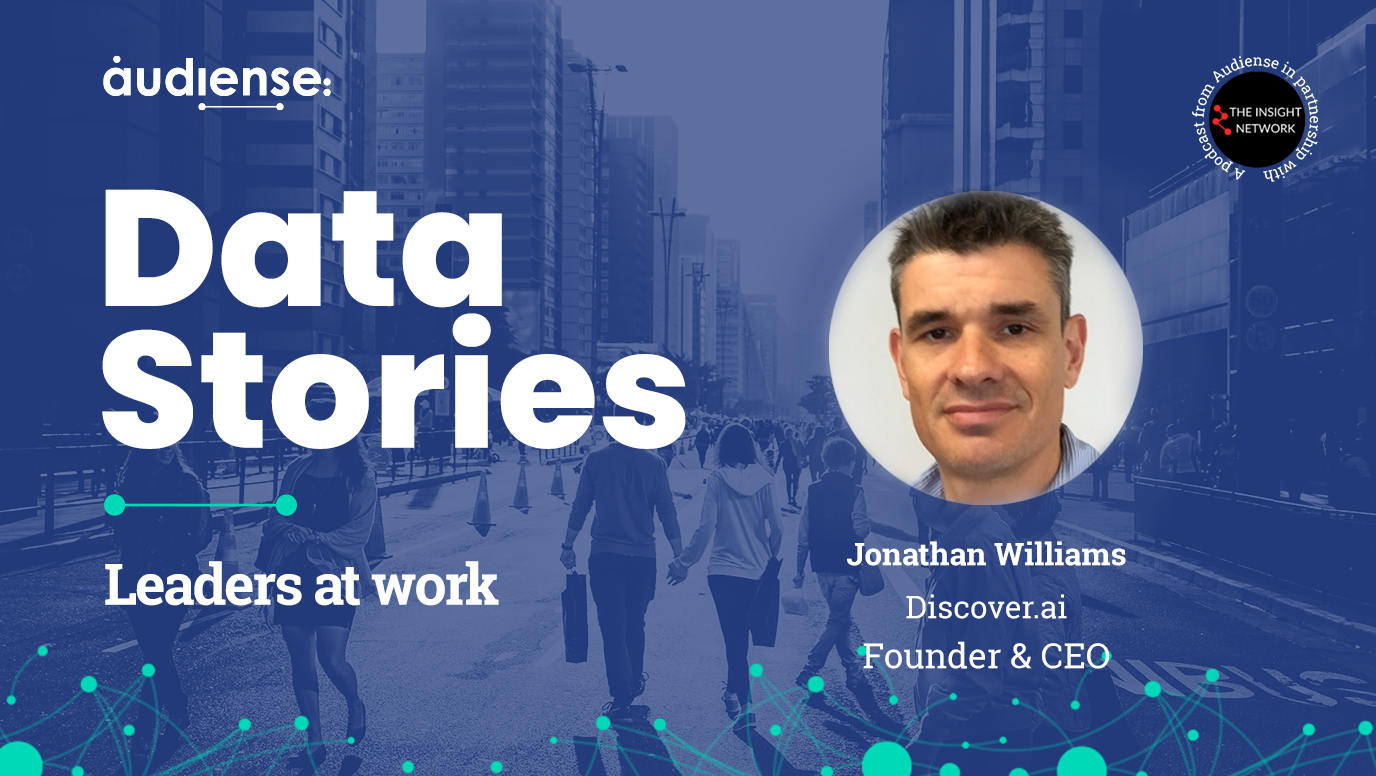[PODCAST] Being the bridge between information and action
Data Stories: Leaders at Work is a weekly podcast brought to you by Audiense. Hosted by Rahul Jerome, founder of insight-intelligence.com, the series captures personal anecdotes and career highlights from some of the most talented and brightest minds in the research and insights industry.
On this episode of the Data Stories: Leaders at Work podcast, I sit down with Jonathan Williams, founder of Discover.ai. Jonathan talks about his journey through market research, his time in angel investing, and why he thinks an AI future is good for human workers.
From the age of six or seven, Jonathan knew that he wanted to start his own business. While at university and studying economics, he was more or less frightened by the idea that he had about four different tax agencies to choose from, and he was more interested in pursuing something not quite so limited. He started looking at advertising and marketing despite going through an economic downturn and managed to land a job at A.C. Nielsen. Jonathan’s CV managed to land on the hiring manager’s desk even though he didn’t have much experience. He didn’t exactly set out to get into marketing insights, but that’s the role he was able to land a job for.
When Jonathan started in insights, there was still a lot of manual collection of information. His main job was to present data results on a regular basis. In market research roles, Jonathan says, you kind of have to be trained in “owning your own presentations” right from the jump. He emphasizes the importance of owning your data analysis. “You should know what you have to say, and not have to turn to chance.”
The need to go beyond your area of expertise
Motivated by a desire to grow his understanding of strategic research, Jonathan moved to Research International. There, he was able to round off his experience of traditional market research, which he’s thankful for. Jonathan talks about the need to step up into a world that moves you beyond your immersion into a specific area of focus. This move can help you apply your skillset to a wider range of clients.
Speaking to the true talent of the marketing insights world, Jonathan shares that: “you can learn the methodologies, you can learn to ask questions, you can learn to analyze it. But to interpret what it means and what brands, businesses, and organizations actually should do—that’s a real skill.” Experience will always help, but Jonathan is a champion of the idea that people should get as involved in the consulting side of insights as early as possible in their careers. The good thing about the disruption with technology is that young starters still need a strong foundation of traditional methodologies. “We have to let younger, great talent shine as much as we can.”
Wanting to expand his experience further, Jonathan moved to Added Value to shift his focus toward a strategic consultancy that started at the client challenge at its heart. Boasting a mixed skill set, Added Value taught him how to provide solutions first, and the branding professionals there truly stretched his thinking about how insights are applied in the first place. What Added Value did differently, he says, is focus on the journey of the customer. They lived at the center of an ethos where the client is at the center, and all other processes are built around that.
Lower your risk by self-funding
Jonathan suggests that you will be able to lower your risk if you’re able to self-fund. Without investors, you have the freedom to do what you couldn’t do otherwise. If you can stomach the debt, then do it—but Jonathan didn’t want to carry that around.
During his time in angel investing, Jonathan learned a few lessons. Namely, that you shouldn’t “dabble” in it—that it’s really only for those whose passion is angel investing. The second big lesson is that you should never invest money that you can’t afford to lose. “Most business opportunities are a potential bullet for investors.” He also suggests looking to invest in people rather than things. They can refine their skill sets over time, which will ultimately help you. Jonathan recommends investing in goods or brands as well as in decision-making technology.
Speaking about Mash Strategy, Jonathan shares how he founded a startup in a completely new industry. He thought he’d ultimately float, but instead, he learned lessons about why you need to deeply understand your industry, and why specific expertise is extremely valuable. Despite all this, throughout its life, Mash existed as an agile, strategy-focused consultancy to its core.
The need for researchers who understand people, consumer behavior and culture
To the younger researchers, Jonathan would like to advise them on the nature of learning methodology. In the old days, it used to be a much more structured process, and the applications were much more limited in that sense. Today, however, AI technologies are disrupting the way that young researchers actually access methodologies for understanding what market insights mean. Many people believe that AI and machine learning will disrupt jobs, and they will for jobs that are process-driven, Jonathan says. But the gap in the middle will be filled by humans who understand people, consumer behavior, culture, and the like. AI will never be able to bridge the gap between data collection and understanding the implications.
To close, he offers the following advice:
- Surround yourself with people better than yourself.
- Don’t be afraid to hire people better than you.
- Give those people the space to work and make mistakes.
You can create a rich corporate culture if you pull this off.
The full version of the podcast with Jonathan Williams can be listened here:





